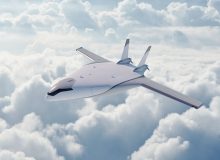 Californian autonomous cargo aircraft developer Natilus has successfully completed multiple flights of the subscale prototype of its 3.8 ton payload unmanned aerial vehicle (UAV). The flight tests for the ‘Kona’ short-haul UAV mark a significant milestone for Natilus by validating wind tunnel tests conducted over three years, testing the aerodynamic performance of the Natilus blended-wing-body (BWB) aircraft design. The subscale prototype of the domestic feeder aircraft took off from a private runway in Southern California and reached speeds of 70 mph. Natilus said one the key challenges with the BWB design has been stability – and the test flights validated that the Natilus configuration can fly without the help of a complex autopilot system. “We are fully focused on completing the full-scale Kona prototype,” stated Aleksey Matyushev, Natilus co-founder and chief executive. “Our Kona remotely piloted aircraft will be capable of carrying over 9,000 pounds (4.3 metric tons) of freight and will open new markets worldwide.
Californian autonomous cargo aircraft developer Natilus has successfully completed multiple flights of the subscale prototype of its 3.8 ton payload unmanned aerial vehicle (UAV). The flight tests for the ‘Kona’ short-haul UAV mark a significant milestone for Natilus by validating wind tunnel tests conducted over three years, testing the aerodynamic performance of the Natilus blended-wing-body (BWB) aircraft design. The subscale prototype of the domestic feeder aircraft took off from a private runway in Southern California and reached speeds of 70 mph. Natilus said one the key challenges with the BWB design has been stability – and the test flights validated that the Natilus configuration can fly without the help of a complex autopilot system. “We are fully focused on completing the full-scale Kona prototype,” stated Aleksey Matyushev, Natilus co-founder and chief executive. “Our Kona remotely piloted aircraft will be capable of carrying over 9,000 pounds (4.3 metric tons) of freight and will open new markets worldwide.
“The progress of Natilus developing autonomous cargo aircraft is a game-changer in the logistics industry, providing an efficient and cost-effective solution for shipping goods across oceans.”
Natilus has also recently completed the full-scale prototypes of both vertical tails. The company will receive Hartzell propellers in May, gearing up for the manufacture of the engine test stand.
The 85 ft full-scale Kona demonstrator, the smallest of the Natilus fleet, will be the largest commercial air cargo drone targeted to fly in 2024, said the company.
 Cargo Breaking News
Cargo Breaking News


